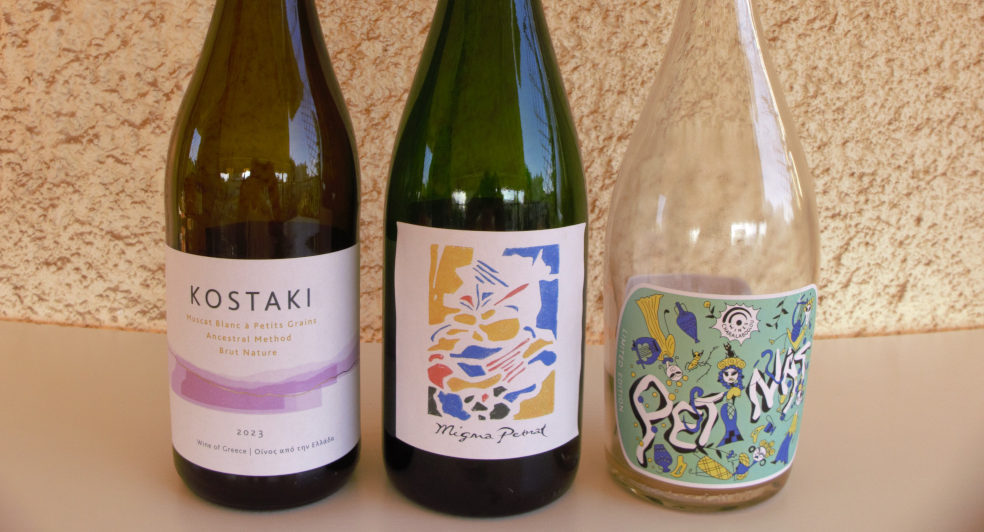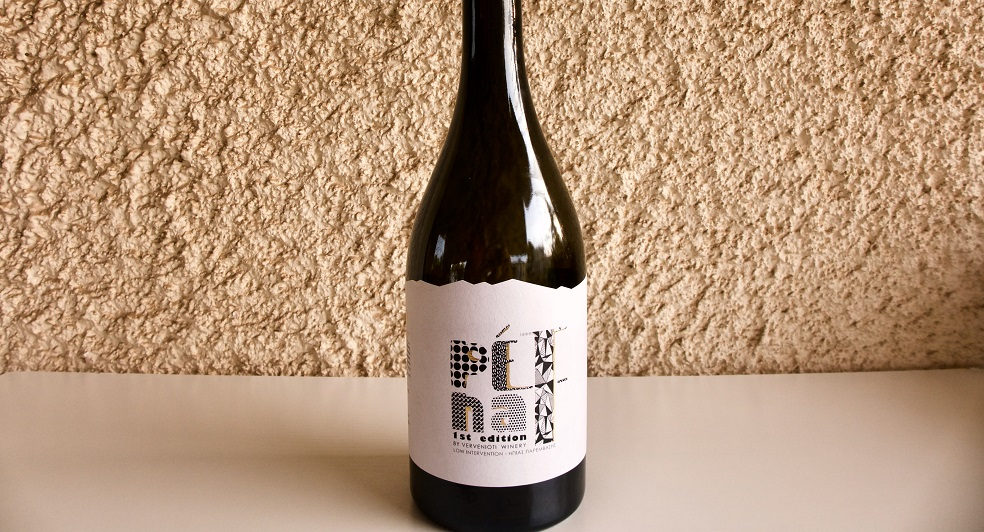Greek Pet-Nat Wines – Ladies Lead the Way
13th December 2024

Four young ladies utterly impressed me with both their character, and, in this instance, their ancestral method* (pet nat) wines. I was compelled to write about them, because their energy was contagious. I will be profiling Evmorfia from Kostaki Winery in Samos, Chloi from Chatzivaryti Winery in Goumenissa, Anthi from Charalaboglou Winery in Serres and Betty from Vervenioti Winery in Mantineia. They are referred to in the order with which I spoke to them and the wines were bought from the market, except the last wine which I tasted at the Wine Art exhibition in Athens.
*Ancestral method: These wines are fizzy, not as much so as a fully sparkling wine or Champagne, and are made by interruption of a single fermentation, bottling, and completion of fermentation inside the bottle. No liqueur de tirage or dosage. How sweet the end result will be is a choice of the winemaker and will depend on how much unfermented sugar is left in the original must. It is also the choice of the winemaker if it will be marketed hazy, with its lees, or it will be disgorged. Usually topped with a crown cap.
My jaw dropped as I was talking to Chloe Chatzivaryti, when I heard that she had been excluded from working in some wineries around the world because she was a woman.
“I know, it’s hard to believe isn’t it? They think we are not strong enough to do the work needed. Being a woman was an issue for quite a few wineries. Actually, one of my placements in Argentina I only got because the guy they had chosen dropped out and they needed someone as soon as possible.”
Wow! It seems that even nowadays, women need to prove they are as good as their male counterparts. Rather heartbreaking.
My jaw dropped a second time when I was talking to Evmorfia Kostaki and I was told about the amazing battle her father had given to overturn a Royal Decree issued in 1934, when the Samos Wine Cooperative was established, that made participation for all viticulturists on the island compulsory (Greece has been a Parliamentary Republic since 1974). All he wanted was to be independent.
But, enough with my rambling.
Evmorfia Kostaki: Studied Chemistry at the Kapodistrian University of Athens, went on to do oenology in France and Italy, followed by post-graduate studies at UC Davis. Has completed her first year of MW.
A young lady that impressed me both with her knowledge, her polite and serious temperament, and her very clear vision of what she wants to attain. Although we spoke for about an hour, the sense I had when we concluded was of a very compact conversation. She doesn’t stray from the point, she doesn’t make small talk.
Although she grew up in Samos, her original plans didn’t include returning to the island with her partner Lorenz Immerfall just yet, but apparently Covid interrupted what she had in mind.
Since in Greece, she has made quite an impression on the wine world.
The winery was founded in 2023 and is located in Western Samos at Megali Lakka – Kondeika. The vineyard is planted on a narrow plane running next to a creek within a forest. This is particularly useful during the hot summer months, because it means that the sun reaches the vines later in the morning and fades early, which helps preserve aromas and acidity. Bush vines, organically certified, planted on terraces. The varieties are Muscat Blanc a Petits Grains, and a mutation of this, which is black skinned. Evmorfia does not agree with planting other varieties. She feels that Muscat is the identity of the island and it is important for an area to have a specific identity. Her father owned 2ha of vineyards and in 2020, 2021 another 1,3ha were planted. The soil is made up of mainly marl, the climate is Mediterranean, but being on an island there is humidity and disease pressure.
The production is currently about 13 000 bottles, all wines are spontaneously fermented, and are low intervention. They currently make 4 labels, two white dry wines, an early harvest Kabinett style wine, and one Ancestral Method.
Kostaki Muscat Blanc a Petits Grains Ancestral Method Brut Nature 2023: Clear, pale lemon, on the nose aromas of lemon and grapefruit, green apple, grapes, hints of lychee, floral notes of jasmine, bread, nuts. On the palate bone dry, with zesty acidity, lean body, and a medium finish. A wine that needs food to be enjoyed.
Direct pressing of grapes, spontaneous fermentation, racking, fermentation completed in bottle and the wine is left on its lees until February when it is disgorged.
Chloi Chatzivaryti: Studied Agriculture/Viticulture at the Aristoteleion University of Thessalonika. She then went on to the Vinifera Euromaster Program and spent 9 months in Montpellier, 1 month in Bordeaux, 6 months in Lisbon and another 9 months at Chateau Margaux for her thesis. This was followed by harvests at Pernod Ricard in NZ, Piccolo Banfi in Mendoza, Mouton Rothschild and Vigna Los Vascos in Chile, Leon Barral in France. She returned to Goumenissa in 2017.
Chloi came across as a dynamic young lady, informal, with quite a sense of humour, and although she seems quite ‘hippy’ she knows exactly what she wants and how to get it. I met her parents a few years ago, who started the winery in 2007 and they are both very successful and opinionated. I wondered: “Did your father just let you come in and take over the winery?”
“Well, he didn’t really have much choice. I said look, I have a job offer from Chateaux Margaux, if you want me to come back you will have to allow me to do the work my way. The truth is that when he realised I would be working without sulphites he gulped. So, up to 2022 we had two separate operations. One was my wines, and one was the labels he made with his winemaker. As of 2023 I took over everything.”
Chloi has been the talk of the town, even from her first wines.
The winery is located in Filyria of Goumenissa, which is a PDO region for wines made of Xinomavro and Negoska. The family owns 18ha of organically certified vineyards, which rise from 350m with some up to 600m altitude. In the process of being biodynamically certified and they are looking towards the idea of Agroforestry. The soils are sand rich clay, mostly clay and the climate is Mediterranean, although, as Chloi tells me, with climate change she has noticed that the area experiences a couple of years of warm arid winters followed by a year of sub-tropical weather. The varieties planted are mainly Xinomavro and Negoska, Roditis, Assyrtiko, Malagouzia and Muscat. They also have plantings of Cabernet Sauvignon and Merlot, which she is not planning on keeping. About half of the 70 000 bottles production are low intervention wines, with about 30mg/lt sulphites at bottling.
Migma PetNat 50% Muscat a Petits Grains, 50% Malagouzia 2023: On the nose aromas of sweet orange, red apple, ripe pear, an intense floral aroma of jasmine and primrose, red plum, kumquat and yeast. On the palate fresh acidity, medium body, medium dry, with a longish finish. Heady.
Whole bunch pressing, cold soaking, spontaneous fermentation with the two varieties co-fermented, fermentation completed in bottle, no fining or filtering, wines are kept on the lees until February, then manually disgorged.
Anthi Charalaboglou: Studied Agriculture/Viticulture at the Aristoteleion University of Thessalonika, spent 6 months at Rollan de By in the Haut Medoc, another 6 months at the Spring Creek Estate in Marlborough, a harvest in Burgundy and then went on to do the Diplome National d’Oenologue for 2 years. Following that she spent 2019-2021 in Marlborough at Nautilus Estate, where she met her South African husband Matt van der Spuy and they both returned to Serres and took over the family winery.
Anthi came across as enthusiastic, friendly, unassuming, adventurous, and committed to wine. “I love wine because it connects you with people, gives you an amazing opportunity to experience things you wouldn’t have had a chance to otherwise, and I love nature. Wine is an endless journey”.
The winery was founded in 2006 and is situated at the foot of Mt Pangaion. 22ha of organically certified vineyards spread out over 5 different plots, with clay and a variation of limestone elements. About 17 different varieties are planted in the vineyard, mainly Greek, with Malagouzia, Assyrtiko and red Koniariko (an indigenous variety) taking the lead. Dry farming means very low production, accounting to about 25 000 bottles. All the wines are organic and low in sulphur. Her older brother is also in the business and her younger sister has designed the labels.
Limited Edition Pet Nat Muscat of Alexandria 2023: On the nose aromas of green apple, ginger, white pepper and peach preserve, with a floral hint of jasmine and hazelnut, brioche, holds the sparkle well, on the palate medium bodied, with fresh acidity and a longish finish. Gave me the sensation of slightly off dry, but that was due to the sweet aromas and not to actual sugar content. A wine that was fun and loveable.
2-3 hours of cold soaking after pressing, spontaneous fermentation but subsequently inoculated with a yeast strain used for champagne production, fermentation completed in bottle, unfined and unfiltered, wines remain on their lees for eight months.
Betty Vervenioti: Studied Chemistry at the University of Patras, went on to the Vinifera Euromaster Program and spent her first year in Montpellier and her second year in Geisenheim, and, in between, an Erasmus exchange with Kyoto University. Following this she spent 3 years as a travelling winemaker and worked in Napa, New Zealand, Australia and Alentejo in Portugal. Returned to the family winery in 2019.

I met Betty at an exhibition and I was taken with her enthusiasm, glow, politeness, friendliness and positive attitude. Knowledgeable, helpful, lively, with an amazing smile.
Three generations of winemakers in Mantineia. The grandparents on both sides made wine and other produce, but when her parents took over the land they decided to focus only on viticulture and sold bag in box wines vinified in the winery that was used since 1912. In 2019 when Betty returned, a new winery was built that was operational in 2021, when she took over and started bottling the wine. They own 5ha of vineyards on the Mantineia plateau, at 600-700m altitude, all goblets, planted 90% with Moschofilero grapes and 10% Cabernet Sauvignon, Merlot, Syrah. Their production is about 8 000 bottles of PDO Mantineia, PGI Rose Mantineia, and a few hundred bottles of the Pet Nat. Sustainable farming leaning towards organic, on sandy clay soils. The area is noted for the high diurnal variation in the summer months, which preserves aromas and acidity. Climate change has been playing havoc on the vintages in the past two years, and as Betty says: “Each vintage, now, is a surprise”.
Pet Nat Moschofilero. I tasted the 2nd edition 2024, which has not yet been labeled (the photo is of the previous vintage). On the nose, beautiful, clear, intense aromas of brioche, apple, pear, sweet lemon, white flowers, rose petals, a slight hint of spice, that follow through on the palate, crunchy fruit, the lees add to the body of a normally light bodied variety, with zesty, refreshing acidity, and a long finish. I was taken by this wine, a marvel.
Spontaneous fermentation, minimal intervention wine, which was disgorged after two months on the lees.
![]()
Olga Antoniadou
South African born psychiatrist/psychotherapist living and working in Athens, Greece. A wine lover since her early twenties, she has been writing about wine for the last seven years, mainly for karakasis.mw. In 2023 she acquired her Diploma WSET.
